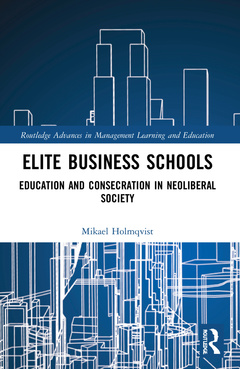Elite Business Schools Education and Consecration in Neoliberal Society Routledge Advances in Management Learning and Education Series
Auteur : Holmqvist Mikael

Social scientists are paying increasing attention to the business and financial elites: There?s a great need to understand who these elites are, what they do, and what makes them tick, as individuals but also as a class. By examining elite business schools, the institutions that train and prepare people to assume important leadership and decision-making positions in business, finance and related sectors, we may also learn how the economic elites are made. A key argument in this book is that elite schools are known to create powerful groups in society, offering them the intellectual and analytical means to act as leaders, but, most importantly, the social, moral and aesthetic skills that are deemed necessary to exercise power; in all essential respects elite schools consecrate people. By dominating much of higher education today, and by doing so in a way that creates and reproduces a market-based organization and control of society, elite business schools represent certain interests and ideologies that affect the lives of most people. In understanding how the modern economy is run, elite business schools, therefore, represent critical study objects.
This book, based on an in-depth study of the Stockholm School of Economics (SSE), offers a sociological analysis of the world of elite business schools. Specifically, this book examines the consecration of SSE?s students from a number of perspectives and in a number of situations, focusing on student union activities, school culture, faculty behavior, teaching, courses and alumni events, noting the symbolic importance of economics and particularly the school?s unique relation among the world?s business schools to the Nobel Prize.
The book addresses the topics with regards to the sociology of elites, management education and organizational studies and will be of interest to researchers, academics, and students also interested in business history, higher education studies, and sociology of education.
1. Education and Consecration of Neoliberal Elites: Introduction 2. Business, Economics, and the Nobel Prize: History and Legacy 3. Admission: Privilege, Values and Practices 4. Consecration, Business Skills and Leadership: The Student Union 5. Teaching Business: The Invisible Hand in Class 6. Affinity: Pedagogics for a Future Elite 7. Academic Freedom and the Business Community 8. Business School Faculty and Neoliberal Thinking 9. Lifelong Social Relationships and Networks: Business School Alumni 10. Elitism and Masculinity: Business Schools and Elite Employers 11. Business Schools and the Consecration of Elites: Conclusions
Mikael Holmqvist is Associate Professor in Sociology and Professor in Business Administration in the Stockholm Business School at Stockholm University, Sweden.
Date de parution : 09-2023
15.2x22.9 cm
Date de parution : 12-2021
15.2x22.9 cm
Thèmes d’Elite Business Schools :
Mots-clés :
Elite Business Schools; Academic Freedom; SSE; Student Union; Stockholm School; Leadership; Young Men; Networking; Swedish Higher Education Authority; Social Relationships; Current Rector; Business Community; Contemporary Society; Higher Education; Business Schools; Nobel Prize; SEK; Business; Elite Employers; Economics; Neoliberal Elites; Extracurricular; SEB; MBA Program; Major Swedish Universities; ECTS; ECTS Point; Dagens Nyheter; Business Sector; Modern Business Schools; Stockholm Archipelago; Follow; Dagens Industri; Swedish Business Community; Professor Ship



